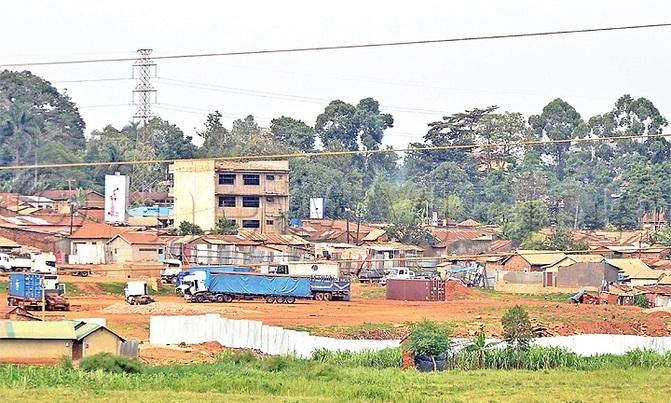Africa-Press – Uganda. A key city drainage wetland that feeds into Africa’s biggest freshwater lake is under threat of extinction.
In a fresh encroachment, unknown developers have descended on Kinawataka wetland and are clearing it to pave the way for industrial development.
Kinawataka wetland runs along the boundary between Nakawa division (Kampala district) and Kira Town Council (Wakiso district) and it is drained by five rivers.
The wetland receives and purifies domestic and industrial waste from Ntinda, Kyambogo, Nakawa, and surrounding areas before reaching Lake Victoria. It also drains water from the eastern parts of Kampala. The swamp filters the wastewater and releases it into the lake.
Despite its importance, the wetland could be no more within days if urgent measures are not taken to stop the encroachment.
In the wake of fresh encroachment, iron sheets have been erected as barricades at two sites sitting off the Kampala-Jinja road.
Residents claim one of the sites allegedly belongs to the Electoral Commission (EC) and the second one is under Banda Development Ltd.
At the heart of the greenery that used to be part of the expansive Kinawataka swamp are two temporary structures, which local leaders allege belong to Meera enterprises.
The locals said the group already has warehouses sitting on what used to be part of Kinawataka swamp at Banda.
However, New Vision could not verify these claims.
In addition, the eastern part of the 25-acre swamp in Nakawa division has been invaded by a sprawling slum at Banda in the valley separating Kyambogo and Kireka. The slum is growing into the middle of the swamp.
The southern side of the swamp is also under attack from encroachers who are mainly residents of Kinawataka slum near the washing bay and Police’s Special Investigations Division, Kireka on Kinawataka road.
“The changes in the swamp have taken place like a whirlwind,” LC1 chairperson of Kinawataka Yafesi Lukwitira said.
He added that the beautiful environment and cold weather they used to enjoy is no more.
“The encroachers have killed the wetland,” he said.
Previously, Lukwitira said, the local leadership worked with the wetlands department to keep the encroachers at bay.
“The people from the wetlands department stopped coming and the National Environment Management Authority (NEMA) took over. Today, NEMA has given up,” he said.
Banda LCI chairperson Vincent Kiyingi said authorities, including the top government watchdog on the environment (NEMA) have been engaged in running battles with encroachers.
“The problem is that the investors deal with top government officials and come to Kinawataka waving their land titles and certificates,” Kiyingi said.
Kiyingi also said part of the fresh encroachment at Kinawataka is going to house the premises of EC. However, the commission has distanced itself from encroachment on Kinawataka swamp.
“We are not encroaching on Kinawataka swamp. It is true that we are going to relocate from the current premises, but we are going to buy a property, but I cannot disclose where,” EC spokesperson Paul Bukenya said.
EC is slated to vacate its current premises near Kitgum House in Kampala to pave the way for the construction of the Kampala flyover.
In a separate interview, NEMA executive director Dr Tom Okurut said it is possible that the people encroaching on Kinawataka are going to sell the property to the EC.
In wetlands that have suffered encroachment, the properties, including land change hands many times in a short time.
Okurut also said he had seen a short video on social media indicating that there is massive encroachment on Kinawataka.
“In the video, there was a voice saying NEMA was doing nothing about the destruction of the wetland,” he said.
“It is not true that we have done nothing. We have been fighting encroachers over the years,” Okurut added.
He said: “we do not have money to do enforcement work. We have contacted the water minister and the Environment Protection Force to take up the matter. As NEMA, we can’t move because we do not have money.”
The NEMA boss also said the Kampala Capital City Authority (KCCA) approves construction of buildings and also undertakes inspections.
“How come they have not been to Kinawataka? The institutions that manage the environment should do their work. We have not given any approvals in Kinawataka. How come KCCA has not gone there to stop the destruction of the swamp?” Okurut said.
Efforts to get a comment from KCCA were futile.
No encroachment
Banda Development Ltd director Fredrick Kagga denied encroaching on Kinawataka wetland.
“As Banda Development Ltd, we want to improve the transport in Kampala and we were cleared by NEMA in 2016. We are going to set up a park and a business centre at our premises,” he said.
“We have not done any encroachment on the swamp. We have an environmental impact assessment study from NEMA in 2016,” Kagga added.
He also said they had put up an iron sheets fence because some of the materials they had put on-site to hold the soil and stop erosion were stolen.
He also pointed out that they have had inspections from government officials, including NEMA and the Wetlands Management Department.
Ecological role
Kinawataka is a chain of wetlands linking Kampala to Lake Victoria. Over the years, the chain of wetlands has been invaded as a result of the expansive settlement, construction of industries, and cultivation of yams and sugarcane.
Kinawataka, together with Kansanga wetland, Nakivubo swamp, and the expansive swamps at Namanve (which was once a forest reserve before it was turned into an industrial park), protect Murchison Bay, which is the source of Kampala’s water.
The chain of wetlands that are part of wetlands in Kampala and greater Kampala are under intense pressure from human settlement, industries as well as public infrastructure, including roads and the railway.
Apart from protecting Kampala’s source of water from pollution and siltation, the wetlands also influence the microclimate of Kampala.
The wetlands are protected by law under the National Environment Act, 2019. The water ministry is also pushing for a specific law on wetland and the Wetland Bill is before Parliament.
Previously, the wetlands were set aside by the colonial government as industrial parks in Kampala. This is the reason why Kampala’s industrial area floods during the rainy season.
Climate change
With the changing climate, which is expected to come with frequent droughts and floods, wetlands are key assets in safeguarding lives and livelihoods during adverse impacts.
For the most part of 2020, the low-lying areas, including Lake Victoria, Kyoga, and Albert were underwater. This has been blamed by experts on the environment and governance on the changing climate and destruction of the wetlands, which act as stores of water.
Activists speak out
Richard Kimbowa, the director of the Uganda Coalition for Sustainable Development, said the challenge of encroachment on wetlands is tied to politics.
“It is about elections, wetlands and forests suffer from encroachment because there is laxity during campaigns and elections. Nobody wants to take stern action against encroachment,” Kimbowa said.
“The local leaders want to be on the side of the people. When the elections are over, the politicians blame the technocrats that they are not doing their work,” he added.
Advocates of Coalition for Development Environment deputy executive director Onesimus Mugyenyi said what is happening in Kinawataka has a historical trend.
“You know the history of this country has been that during elections, politicians and those who govern the environment stop enforcing the law,” he said.
Mugyenyi added: “It has become a norm to encroach on the wetlands and the forests. People know politicians are in politics. After elections, it will be hard to evict encroachers. They will start talking about human rights and say that you cannot throw people into the cold without alternatives.”
Moses Mawa, a resident at Kinawataka, said rich people are taking over wetlands.
“They work with the government to destroy the environment. The people at Kinawataka are annoyed about the double standards. People with connections have been cleared to destroy the wetlands,” Mawa said.






